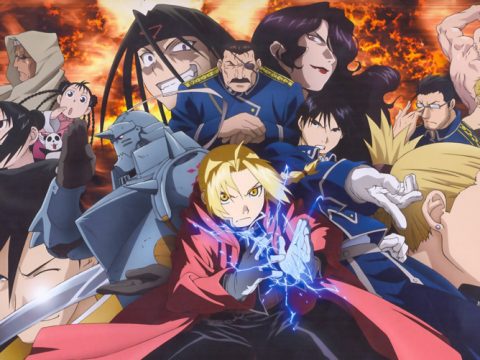[Interview excerpted from the December issue of Otaku USA magazine.]
At the Anime Expo convention in 2007, J-rocker Gackt performed as part of the band S.K.I.N for the first time in the US. This super group, whose members are Gackt, Yoshiki, Miyavi, and Sugizo, seemed to herald a new Visual kei renaissance that was spreading fast throughout the western world.
Gackt Kamui (age unknown) is a perfectionist, intelligent, has a beautiful voice, face, and body. He also plays multiple instruments, can speak many languages, is health conscious (he hasn’t eaten rice for many years), and is extremely rich. Moreover, he refers to his fans as “dears.”
Gackt first became noticed in the Japanese indie music scene when he joined Malice Mizer-the 90s ultimate-in-excess Visual kei band. With otherworldly costumes, music, and stage presence, they attracted a wide group of fans who totally committed themselves to their hero’s “sweet poisoned” world.
After Gackt said “farewell” to Malice Mizer, he began appearing regularly on TV music shows and talk programs. His “more than human” appearance and persona were a hit with the mass media in Japan.
It was as if a fictitious character suddenly popped out in the real world. No one knows where Gackt will guide us from here, but this much is certain. He’s ready to show the whole world something new from Japan.
 Izumi Evers: Congratulations on the American debut of S.K.I.N. Please tell us about the origins of this project.
Izumi Evers: Congratulations on the American debut of S.K.I.N. Please tell us about the origins of this project.
Gackt Kamui: About two years ago, Yoshiki and myself started thinking that this kind of project would be interesting to do. Since then, everything started happening fast and the band became a reality. While we were looking for other members, we met Sugizo and Miyavi.
Evers: What’s it like being friends with Yoshiki and how did he become a member of S.K.I.N.?
Gackt: Ever since I met him, he felt very familiar to me. We became very close, even more than brothers. In terms of S.K.I.N., our idea was actualized while we were talking about it.
Evers: What are your impressions of Miyavi and your feedback about his performance in S.K.I.N.?
Gackt: Miyavi is like a little brother to me and he is full of talent. I believe there is another guitarist in Japan who is that talented for his age. There is a part of his personality that’s very sensitive and another part that’s very crazy. I like him very much.
Evers: How about Sugizo?
Gackt: He is always thoughtful about things and very cautious. I could tell just by talking to him how much he really loves music.
Evers: Is your vocal style in S.K.I.N. different from your usual solo style?
Gackt: It is more aggressive (in S.K.I.N.) but I’m not too conscious of it because the band’s image can be easily changed depending on the members.
 Evers: So what are your goals as a musician in terms of the overseas market?
Evers: So what are your goals as a musician in terms of the overseas market?
Gackt: It is my personal goal that my actions will help to develop Asia’s position in various countries in various categories. Currently, particularly in the area of music, the position of Asians is very low, so I’m hoping my activities will have a positive effect on those Asians who are full of talent. Also, I believe that it is my mission to help get rid of the gap between countries through my music.
Evers: What do you think has changed most about you personally since your time in Malice Mizer? Also, is there anything you’d want to do again, or not do again?
Gackt: During the time of Malice Mizer, I used to help organize and do coordination for the band. But this time with S.K.I.N., I want someone else to take over that role. I’d rather be in a position to support whoever is holding things together. And also, I really want to avoid fights among the band members. Naturally, since band members have lots of ego, it’s easy to have conflict. But especially in this band, I don’t want to have any fights.
Evers: What is the difference between your foreign fans and your Japanese fans?
Gackt: There’s no difference. An honest reaction is the same in any country. They react well to a good thing and react badly to what’s bad.
Evers: Do you have any new goals or things you want to try out when it comes to making music?
Gackt: It’s a secret. Please wait and see. Please look forward to hearing my music. It’s coming up in the future.
Evers: I’ve heard you did voice acting work for the Japanese dub of Luc Besson’s film Arthur and the Invisibles. David Bowie performed the character (Maltazard) that you voiced in the English version. Did his performance influence yours in any way?
Gackt: David Bowie’s original voice was kind of monotone, so if I followed that in the Japanese version, I wouldn’t be able to describe the emotional ups and downs of the character. Therefore, I tried not to be too conscious of his voice.
 Evers: I heard you are a big fan of Mobile Suit Gundam. Please explain the appeal of this anime for you.
Evers: I heard you are a big fan of Mobile Suit Gundam. Please explain the appeal of this anime for you.
Gackt: Mostly, I like the first era of Gundam. I like the theme of the story especially, which is that the shape of good and bad can be changed depending on where you are standing. It’s not something that someone can determine and, no matter what, nothing but sadness can be created from someone’s death. I think this anime describes the heartlessness that exists in this world.
Evers: Do you own any Gundam– related goods?
Gackt: I personally don’t have much interest in collecting goods and merchandise. But since people are constantly giving me Gundam goods, I have a lot.
Evers: You are currently acting in the NHK historical drama Furin Kazan playing warlord Kenshin Uesugi. Has this role influenced you in any way?
Gackt: I am myself Kenshin Uesugi. You will see what I mean when you watch the show.
Evers: You’ve done voice acting, drama, and music. Is there anything else you want to do?
Gackt: (No answer)
Evers: Overseas interest in Japanese pop culture has spread from anime, games, and manga into other areas like music and fashion. Now there seems to be a lot of interest from foreign fans in the beautiful male fantasy figures often found in Visual kei. What do you think about non-Japanese fans’ interest in sexually ambiguous men that have rarely been popular outside of Japan?
Gackt: I think this phenomenon is happening naturally and spontaneously. I don’t think that (Visual kei artists) are trying to create a completely feminine atmosphere. It’s not like that. So I think no matter who they are, everyone likes beautiful things regardless of gender. L
Gackt’s The Greatest Filmography 1999-2006 is available on US DVD from Viz Pictures. Gackt’s official website: https://gackt.com







